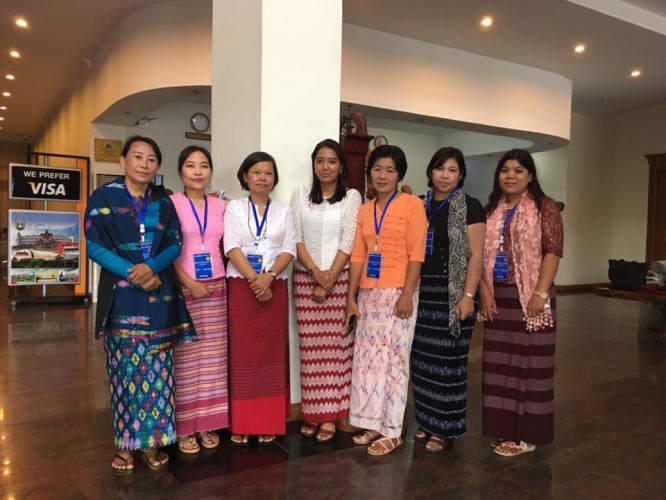The 21st Century Panglong Conference was intended to be inclusive of all sectors of society. But one voice has been conspicuous by its absence from the peace talks – that of women.
Women’s groups were invited to the conference under an ‘observer’ status, not as representatives with a seat at the negotiating table.
“Women represent 50 percent of the population, so if you don’t have the voice of the other 50 percent whatever you do will be incomplete,” said Su Su Swe, who is at the conference representing Women’s League of Burma. “Inclusiveness is a key matter in the peace process, so women’s participation is also a dimension of its inclusiveness.”
In his opening address, United Nations Secretary-General Ban Ki Moon called for a minimum of 30 percent representation of women at all levels of the peace talks. There were no mentions from national representatives about including women.
“It was really obvious at the opening ceremony when there were only eight speakers – and the only one female speaker is Aung San Suu Kyi,” said Su Su Swe.
Nang Phyu Phyu Lin, chair of the Alliance for Gender Inclusion in the Peace Process (AGIPP), says women are one of the most affected groups by the armed conflicts throughout the country, and that peace and security for women and children needs to be made an urgent priority.
“Gender-based violence, especially sexual violence in conflict areas, is a challenging factor of the root cause, it is a kind of power abuse,” said Nang Phyu Phyu Lin, speaking to DVB on Wednesday at the conference in the Burmese capital Naypyidaw.
[related]
In a shadow report submitted to the Convention on the Elimination of all Forms of Discrimination Against Women review committee, Gender Equality Network recommended severe punishments for those who commit rape or sexual violence, so that the climate of impunity can be eliminated.
Women’s groups continue to document cases of rape and sexual violence in the armed conflicts in different parts of the country despite facing a lack of support from the government. In June Ta’ang Women’s Organisation was forced to cancel the launch of their report, Trained to Torture, which documented allegations of human rights abuses committed by Burma’s military against ethnic Ta’ang people in northern Shan State.
“Women are suffering a lot from the fighting. They are always the victims, so women’s voices should be heard. There are still a lot of sexual violence cases and justice needs to be found as the number of cases is still increasing,” said Su Su Swe.
A UN committee reviewing Burma’s compliance with an international convention on women’s rights recently handed down concluding observations to the government. To date, no action has been taken.
“One of the recommendations was to have a temporary special measurement like a quota of 30 percent, so we do hope the quota system will be in place soon,” said Nang Phyu Phyu Lin. “Women’s participation [in the peace talks] is related to the policy and attitude of people linked to the political will of the government.”
Eight women’s organisations under the umbrella group AGIPP produced a policy brief leading up to the conference, but did not get the chance to submit the paper due to their status as ‘observers’.
“We hope to give some concrete recommendations and, after this conference, review the political dialogue framework,” said Nang Phyu Phyu Lin.
The women’s groups say they hope to have an opportunity to actively participate in the next round of the 21st Century Panglong Conference when it reconvenes in six months.



